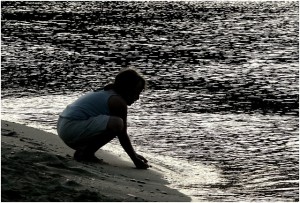The signs of autism in older children are more varied but still revolve around the following (DSM-IV-TR):
a. Impaired social interaction
-little or no eye contact,
-unable to develop friendships with peers,
-unable to enjoy and share interests and activities with others
-unable to use imagination or engage in pretend play
b. Qualitative impairments in communication
-delayed development of spoken language or none at all,
-speaks in an abnormal tone of voice,
-repeats what others say,
-takes whatever is said too literally;
c. Restricted, repetitive and stereotyped patterns of behavior
-repetitive motor movements such as hand flapping/rocking back and forth,
-preoccupation with objects such as spinning wheel, cars
-has narrow topic of interest and obsesses/memorizes facts such as train schedules, maps
-follows a rigid routine and gets upset with unexpected changes.
Source: DSM-IV-TR
